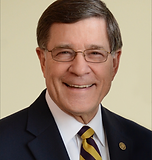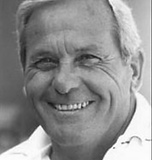
Class of
2019

David Brewer
Community & Public Service
With his record of service, David Brewer has heard a lot of knocks on the door looking for his help. Since arriving in Huntington in 1963, Brewer has been involved in the launching of several organizations and sat in leadership of many others. He has volunteered his time to projects as varied as coaching PAL Basketball to helping restore the LaFontaine Center. The Cleveland native came to town after earning his undergraduate and law degrees from Indiana University and joined the firm of Bowers, Feightner & Palmer. He has held leadership positions in the Huntington County Bar Association, and has been admitted to practice before the U.S. Tax Court, the U.S. District Court, and the U.S. Supreme Court. Brewer’s lengthy resume of volunteering earned him the first-ever Charles Burgess Award from Huntington Kiwanis and the Herbert LaMont Award from Pathfinder Services. He was named the 1982 Chief of the Flint Springs Tribe.

Fred Fields
Athletics & Recreation
Growing up in the basketball hotbed of Muncie, it was inevitable that the game would make an impact on the life of Fred Fields. A Muncie Southside High School alum, Fields became friends with several Muncie legends who would become lifelong influences. He began a teaching and coaching career at Huntington North High School, initially coaching in the boys program before taking over as girls head coach in 1987. Fields led the Lady Vikings to their first state finals appearance in 1989, losing in the semifinals. The next season, Huntington North won its final 21 games en route to the school’s first state championship. The Lady Vikings added a second title in 1995, finishing with a 28-1 record. In a two-year run through 1996, the Lady Vikes won 44 straight games, reaching No. 3 in one national poll. In his 10 seasons at HNHS, Fields compiled a 206-49 record. He coached three Indiana All-Stars, and in 1996, he was named coach of the Indiana All-Star team. He was inducted into the Indiana Basketball Hall of Fame in 2011.

Dr. Eugene Habecker
Humanities & Cultural
Eugene B. Habecker was born in the house he grew up in – one of six siblings on a dairy farm in Lancaster County, near Hershey, Pa. As a student with “big dreams” of a life beyond bucolic Pennsylvania, he yearned for an education at a Christian college. He found that at Taylor University, where he also found a fellow student, Marylou Napolitano, who would become his wife. Habecker came to Huntington in the summer of 1978 as the eventual successor to President E. DeWitt Baker. He spent his first year on the job assembling the college’s long-range development plan, which has served as the blueprint for the ongoing physical transformation of the campus. At age 35, Habecker became one of the youngest college presidents in America. For the next decade, Eugene Habecker worked to carry out the plan he had designed. He left Huntington in 1991 to head the American Bible Society, then returned to Taylor as its president in 2005. He retired from Taylor in 2016.

George Haines
Athletics & Recreation
George Haines began his swimming career in the legendary Huntington YMCA program under coach Glen Hummer. Haines followed Hummer into coaching, and in 2001 was named Coach of the Century by the International Swimming Hall of Fame. He swam on Huntington’s national championship teams in 1940 and 1946. After serving in World War II, Haines went west, coaching at Santa Clara High School and starting the Santa Clara Swim Club. His high school team won 215 consecutive dual meets and 11 unofficial national titles. From 1968 to 1970, his swimmers held national high school records in all strokes at every distance. The club team won 43 national titles and broke more than 200 world records. Haines produced 53 Olympians, including Mark Spitz, amassing 44 gold, 14 silver and 10 bronze medals. Haines was head U.S. Olympic coach three times. Haines died in 2006. A statue of Haines stands over the Santa Clara pool where he coached, now called the George F. Haines International Swim Center.

Ralph & Barbara Johnson Family
Business & Professional
For more than 90 years, the Johnson family has provided the daily fuel to keep the residents of Huntington County moving. Initially, that meant the actual gasoline that filled the cars and trucks. Later, the business expanded to offer a different kind of fuel — the coffee, donuts and snacks from their Johnson Junction convenience stores with a variety of offerings for people on the go. Edward Johnson started Johnson Petroleum while working for Standard Oil in 1928. He sold the business to his son, Ralph, in 1971. Ralph continued to build the business by adding volume, trucks, and opening it first convenience store in 1975. When Ralph retired in 1999, he sold the wholesale division to his son Ryan, and the retail business to his daughter Darlene. Through the years, all of the Johnsons have given back to the community. They have been on numerous boards, volunteered in service and church organizations and contributed philanthropically.

Roxy Lefforge
Historical
While being held in a Japanese prison camp in the Philippines in 1945, Roxy Lefforge was just moments away from being killed by her captors when American forces stormed the camp, rescuing her and 2,000 other prisoners. A Methodist minister, Lefforge had been a missionary in China and the Philippines since 1918. Despite her harrowing experience, she was determined to remain in the Far East to continue her work after the war. She helped create the Philippine Wesleyan University and served as president and executive dean of the Philippine Christian Colleges. Lefforge returned to the United States in 1954 and settled in Huntington, where she was a professor at Huntington College from 1954-64. She was also a member of Trinity United Methodist Church until her death in 1977. Her presence remains in the Philippines with the Roxy Lefforge Methodist Church and the Roxy Lefforge Foundation Colleges.

John Niederman
Business & Professional
John Niederman and Pathfinder Services have been on an extraordinary journey, together, for nearly 35 years. Pathfinder, the Huntington-based social services agency, has earned state and national accolades for the breadth and quality of its human and community development services. Niederman has led the organization to that recognition, and in the process has himself been recognized as an imaginative, inspiring voice in social services policy. In 1978, Niederman, a Notre Dame graduate, and his wife Judy moved to Fort Wayne, where John took a position as director of special services and vocational education for the Anthony Wayne Rehabilitation Center. Niederman joined Pathfinder in March 1985 as its president and chief executive officer. Under his leadership, Pathfinder has become a statewide leader in comprehensive human and community development efforts and has established offices in several northern Indiana locations.

Walter Rusk
Community & Public Service
Walter Rusk had a profound influence on Huntington County still evident today. As county agricultural agent for more than 20 years, he helped local farmers to modernize methods. He advocated for young people and developed one of the top 4-H programs in Indiana. Serving as county agent from 1941-63, Rusk was an important liaison between the rural community and the Huntington business community. He established the annual Achievement Night that was the social highlight of the year for both the rural population and city folk. His lasting influence was on the young people of the county. He created the Rural Youth program, an organization with activities for young people after high school that was eventually adopted all over the state. Rusk bolstered the Huntington County 4-H program, building one of the largest enrollments in the state. He had the vision for the local 4-H Fair, making the focus on the youth and their projects instead of adding a carnival midway — a model that continues to this day.

Harold Shultz
Historical
In looking for an All-American hero to represent Huntington, or any other community for that matter, the search needs only reach the name of Harold Dean Shultz. A top student, star athlete, war hero, dedicated teacher and devoted husband and father, Hal Shultz filled every one of those roles throughout his remarkable life with uncommon humility and dignity. A standout athlete and valedictorian at Huntington High School, Shultz earned an appointment to West Point. He was a standout football player and earned the Army Athletic Association trophy as the school’s top student athlete, graduating 11th in his class. Shultz became a fighter pilot in the Air Force, serving in Korea and Vietnam. Among his many honors were a Silver Star, Bronze Star, and two Distinguished Flying Cross awards for his actions and service. He also served as an instructor, and earned three master’s degrees. Upon retirement from the military, he began a teaching career. He died in 1978 at the age of 48.

William & Marjorie Zahn Family
Business & Professional
First Federal Savings Bank can trace its corporate lineage back more than a century. But the First Federal we know today began 62 years ago, when a Huntington businessman, William Zahn, joined the board of directors of People’s Savings and Loan. That board appointment led to Zahn becoming a bank employee. He rose quickly to become a vice president and, in 1963, was named its president. Three years later, the institution’s name was changed to First Federal Savings and Loan, now First Federal Savings Bank. William Zahn retired from First Federal in 1990, but his legacy of family leadership continues at the institution. His son, Stephen E. Zahn, joined the bank in 1966 and became its president and chief operating officer in 1980. The third generation of Zahn family leadership at First Federal arrived when Stephen Zahn’s son Michael joined the business in 1996. He succeeded his father as president and in 2011 became the bank’s CEO.
